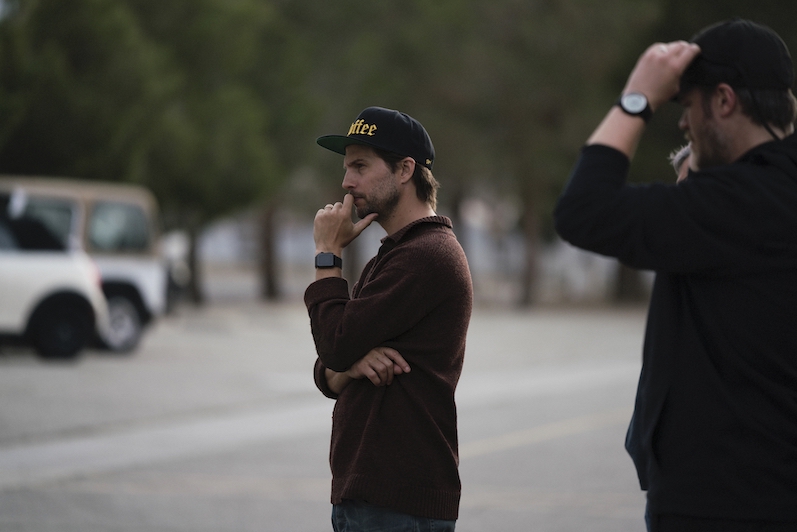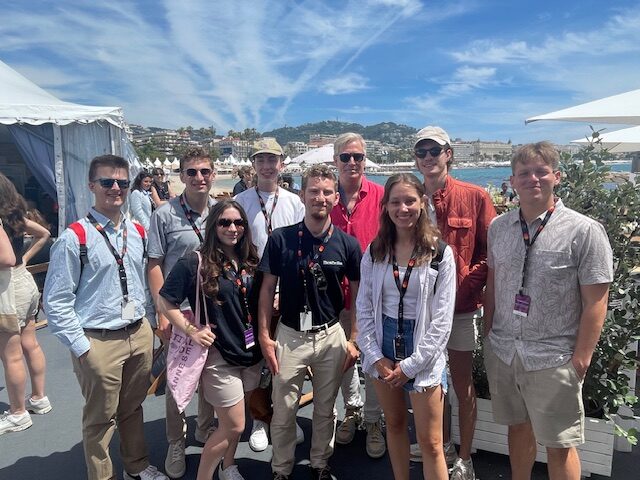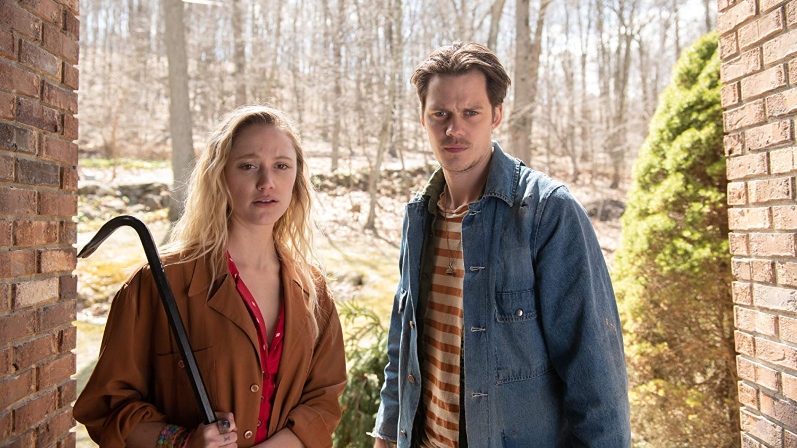As the son of two drama teachers, LOGAN MARSHALL-GREEN was perhaps fated to become an actor. After receiving his M.F.A. from NYU’s Tisch Graduate Acting program, Marshall-Green soon became a recognizable presence on stage, TV, and film screens. Off-Broadway, he starred in the Public Theatre’s King Lear (for which he received a Drama League nomination); on TV he’s appeared in series such as The O.C. and Quarry; he’s shown up in studio franchise tentpoles including Prometheus and Spider-Man: Homecoming; and he headlined the breakout indie films The Invitation and Upgrade.
But moviegoers will now get to see a new side of the busy actor on screens… sort of. This time he’s taking on a role where he doesn’t actually appear on-screen at all. ADOPT A HIGHWAY finds Logan Marshall-Green stepping behind the camera as writer/director for the very first time. And a splashy first time it turned out to be, landing a powerhouse producer (Jason Blum), an iconic star (Ethan Hawke), original music by a Grammy-winning singer/songwriter (Jason Isbell), a prime festival premiere, and now a U.S. release.
Adopt a Highway stars Hawke as a man recently released from prison, whose discovery of an abandoned newborn baby alters the course of his re-assimilation and his life. Elaine Hendrix and Betty Gabriel co-star in the film, which had its world premiere at the 2019 SXSW Film Festival. Audiences will be able to catch the film in theaters, VOD, and digital HD on November 1, courtesy of RLJE Films.
We had a chance to chat with newly-minted writer/director Logan Marshall-Green to talk about his transition from acting to directing, working with Ethan Hawke, and more.
——
COLIN McCORMACK: You’ve been acting for a while now, but how long have you been interested and writing and directing as well?
LOGAN MARSHALL-GREEN: I’ve been acting for about 20 years and I’ve been writing to direct for the last 15 years, I’d say. I’d been developing a script for a good six or seven years and then finally put pen to paper, but it was a little too demanding financially. So, as is the case with many first-time directors, I wrote my second script so I could go and make my other script.
CM: Was there a spark or specific moment that made you finally say, “Now is the right time to put pen to paper?”
LMG: Are you talking about with this script or just in general?
CM: In general. Everyone who’s a writer thinks about it for a long time and then eventually you have to stop thinking and start writing.
LMG: Yeah. With my first script, I had been developing, like I said, for many years. It’s about a man lost in the woods; a true story. So, I’d hike with it, develop it, I had notebooks and the article from Scribner’s Monthly from 1870, had everything kind of prepped and ready, but I didn’t know how to put pen to paper. It only was when I was shipped off to shoot a film in Amman, Jordan, and I had so much downtime and was stuck at this hotel and jetlagged. I was just jetlagged enough and stupid enough that I began [writing] and four weeks later I had a script. I couldn’t stop, it just came. I’ve done the same with all of my scripts since. I develop it, I research it, I think about it for a few years and then hopefully I give myself a fertile scenario to just let it pour out and go through all the problem-solving that is screenwriting.
CM: There’s a level of vulnerability in being an actor and putting yourself out there. But when it comes to sending your script to somebody to read, is there a different level of vulnerability you feel in terms of trying something new and [deciding] who to first send it to?
LMG: I mean, I don’t think there’s anything more stressful than saying those five words: “Would you read my script?” [Laughs] Acting’s easy compared to asking people to spend two hours reading something you spent years making. I had no idea what was going to happen. I’m not kidding. I sent my first script to my team and inner circle of friends and my cup runneth over, I was told to keep going and I had something. So I kept going. Like I said, it demanded a bit more financial confidence, so I decided to write something that was a little more makeable, if you will.
The only thing I knew I didn’t want – the exercise I wanted to write with – was I didn’t want any sex, violence, drugs, explosions, anything sexy or fun, because I was told that’s what I needed. And I also was told I should not write anything original. “Go find that sexy hot IP,” that’s what they tell everybody. That sexy hot IP. I’m sorry, man, it’s all bullshit. There’s so much original material in all of our heads out there, it’s so ridiculous that we can’t write it. I’m sorry, I just decided, No, I’m going to write something original. I’m going to write a story without any drugs, violence, or sex. I’m going to write a story about a man who’s not competing for your attention in every single scene. I’m going to write a man without toxic masculinity. I’m going to write a man who has made mistakes, and it’s going to be up to you to forgive him or not. I’m hopefully going to put that in your laps, hand you people I hope you’ll forgive, and it’s up to you to do it.
CM: When writing Adopt a Highway, was it the character first that came to you in terms of inspiration? Or the concept of the prison industrial complex? What part of it spoke to you first?
LMG: The thing that spoke to me first was just being lost as a father. So I started with myself: What did I know? Because I knew if I was going to write something that didn’t lean on all the things I wanted to lean on, which is action and sex and rock and roll and sci-fi and horror and all the rest, I knew I was going to have to start with truth, my own truth. And that’s where I was. I became a father almost overnight. I fell in love with my daughter and I didn’t know what the hell to do. I was simply lost as a dad, so I started there. I knew I wanted to write a story about a man who found a baby. I also have a lot of respect for the men and women in a penal system that is far from broken, it’s working perfectly [as intended]. But I wanted to move away from it quickly. The beginning of the film ends and the end of the film begins, and that’s intentional. It’s not an indictment of the system, not at all. If you want an indictment, there are great indictments of the system; it’s not my film. The indictments of the system are Ava DuVernay’s 13th, you know? There are many out there to show you that the system is not broken, it’s working perfectly, but that was not my intention. My intention is about purpose, it’s about forgiveness, and it’s about mistakes and how we have gone to our corners and armed ourselves with weapons and nobody wants to talk anymore. We just want to fight.
CM: As an actor, there’s a certain amount of research you likely do to help build your character, but as the writer, you’re doing that building from the ground up. What type of research did you do when you were developing Russell and is it much different from your process you take as an actor when connecting to a character?
LMG: I’ll answer the second question first: It’s a totally different process because I’m not being handed the role. I’m having to create it, like you said, from the ground up. It’s a process I love, but it’s something that I had to tap into a different corner of my creative being and it was not one that I had worked. I am today, even still in my own writing, learning as I go. I’m not a distinguished or seasoned writer by any means, so I have to not just do all the normal problem-solving of the narrative, I have to do all the problem-solving of being a lesser writer.
To answer your first question, the research I did, outside of politics and the penal system, was not much. There is a common thread in all of my scripts, which is Wyoming, which hopefully people will see in the future. I had taken a trip up to Casper– essentially, I took the bus that you see him take from L.A. to Casper. I’ve done that bus ride a few times and I’ve certainly driven it more than a few times. The only real research was getting a clear understanding of Casper, what it means to be from Casper, its own politics and its own pain. But other than that, this is not a story-driven narrative, this is a character-driven narrative. So most of my research and most of my work was trying to find and form a real three-dimensional character that you’ve never seen on film before. All of those things, all of those touches, were written, were there, but you can’t put it on screen unless you have an actor capable of going to those depths. And in Ethan, we hit the moon.
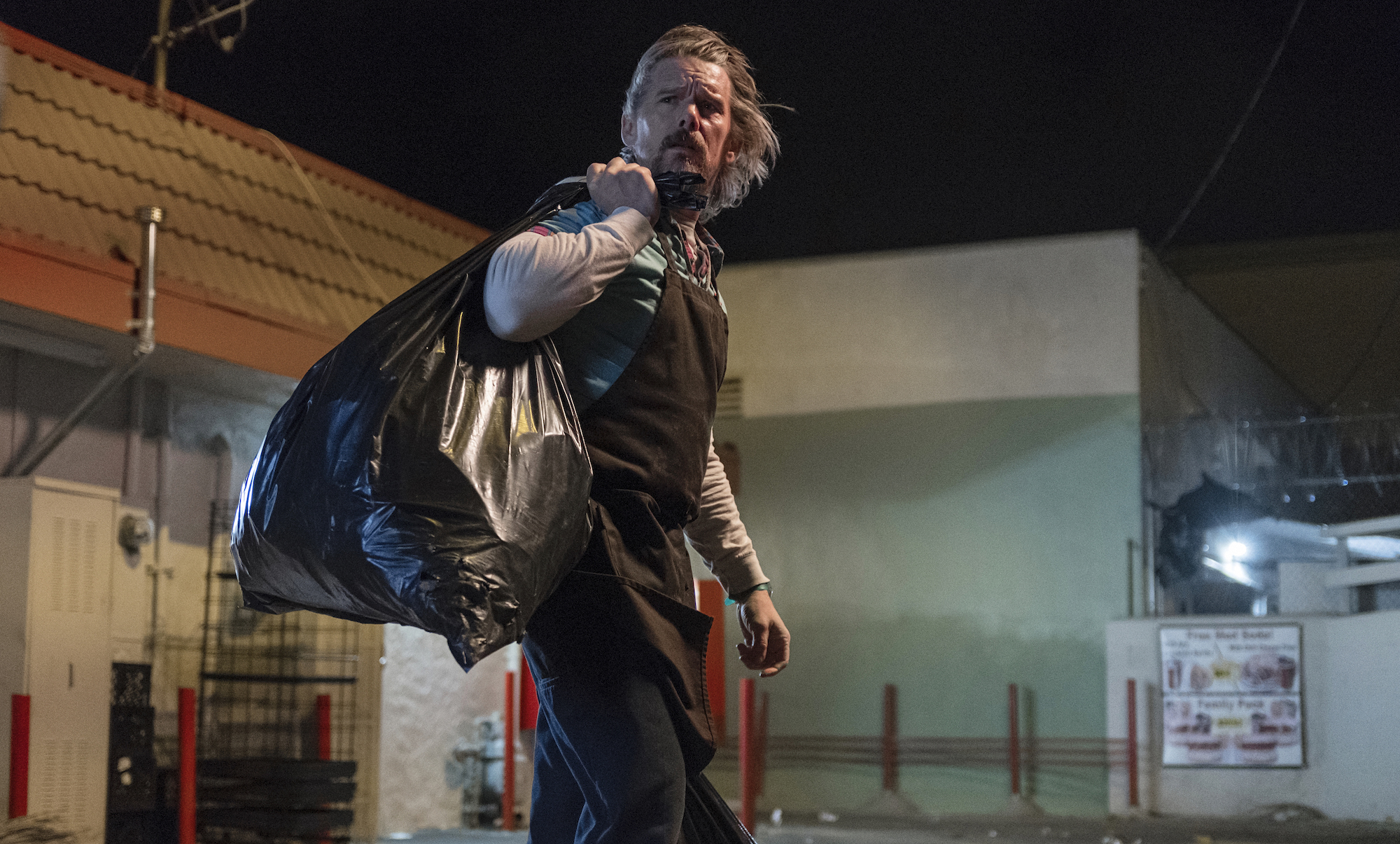
CM: Yeah, a lot of actors who transition to filmmaking write roles for themselves. What made you want to bring on somebody else for the role?
LMG: Because I had no intention or ability to direct myself as an actor. I’ll never be a first-time filmmaker again, but my gosh, I know so little now that I don’t know how I’ll ever not be a first-time filmmaker.
CM: What was the process like getting Ethan Hawke attached?
LMG: The process was surprisingly not as daunting as I thought it was going to be. We got very lucky. It was certainly a scenario of kismet in getting Ethan to read it. He liked it, and then separately we decided to approach Blumhouse, who I had just worked with on Upgrade, knowing – which is something many people don’t know – that Blumhouse doesn’t just make horror films. They make really fucking good films and they make great TV and they make small independent films that have real gravity and substance to them. So in the room, they asked me who do I want for it and I said, “Well, Ethan Hawke is interested.” And of course, as is the case normally with me, I’m an idiot and naïve and forgot that Jason Blum and Ethan formed a theater company back in the ‘90s called Malaparte, which I’d wanted to be a part of like any other New York theater actor coming out of grad school. I wanted to be a part of the hot Off-Broadway. So of course, the rest is history. We were making the film a year later.
CM: Had you ever met Ethan before this?
LMG: I had met Ethan. Ethan and I were, at best, acquaintances before this film. We have a few mutual friends. I certainly knew who Ethan was as more than a film actor. I knew Ethan from the theater as a thespian, not just as an actor but as a writer/director. I approached Ethan letting him know clearly that I came up in live theater, the New York theater scene, wanting to be a part of that rock and roll crew of Peter Dinklage, Ethan Hawke, Josh Charles, Sammy Rock, John Conlee, Billy Crudup. All I wanted was to be a part of their club, and I couldn’t. And I think that’s what I told Ethan. If you can’t beat ‘em, join ‘em, so I decided since I couldn’t make films with them, I’d just make my own.
CM: In terms of people you’ve made films with, you’ve worked with Ridley Scott, Ava DuVernay, Oliver Stone, Julie Taymor. Are there any memorable lessons from directors you’ve worked with in the past that you could consciously apply to Adopt a Highway?
LMG: Yeah, there’s no doubt. I pride myself on the women and men I’ve worked with, and I’ve certainly not spent a lot of time in the trailer. I spent time watching them and shadowing them, as I do with anyone. I took a lot from Karyn Kusama, who I think is one of the best directors out there right now. That said, if there’s a director who I took the most from though, it’s someone I’ve never worked with and someone I’ve always loved, which is Michael Haneke. My style – some people like it, some people don’t – is directly influenced by Haneke in creating deep frames and allowing the audience to be the editors, and only moving camera when absolutely needed; never getting in the way of performance and always deepening and never broadening the story. Michael Haneke is a huge influence on me. [Bruce Beresford’s] Tender Mercies is a film that influenced this film in the simplicity of its storytelling and in its lead character being our chaperone. So while I’ve worked with great directors, I’ve certainly stolen from other great directors I haven’t worked with.
CM: Despite all the sets you’ve been on and the people you’ve been able to observe through your career, was there anything about directing that took you by surprise once you were actually in the middle of it?
LMG: I mean, was there anything about directing that didn’t take me by surprise once I was in the middle of it? The question is how much prep did you do. How much don’t you know you don’t know? Because you’re going to find out! [Laughs] The question is how are you going to digest that information when you realize just how much you didn’t know. But that said, I’ve been so excited to get to sets as an actor, and I’m even more excited to get to set as a second-time director. I have so much more information now. And I say that first part because of watching Ethan, watching him be so available to a director’s vision while trying to sell his own film that he directed and wrote at the same time. His ability to be facile and put on different hats was something I observed as an actor and is something that I will continue to put into my own work ethic. I tend to have a strong work ethic I think, and I certainly was anxious to try on these new philosophies. In many ways, Ethan has changed me not just as a director, but as an actor.
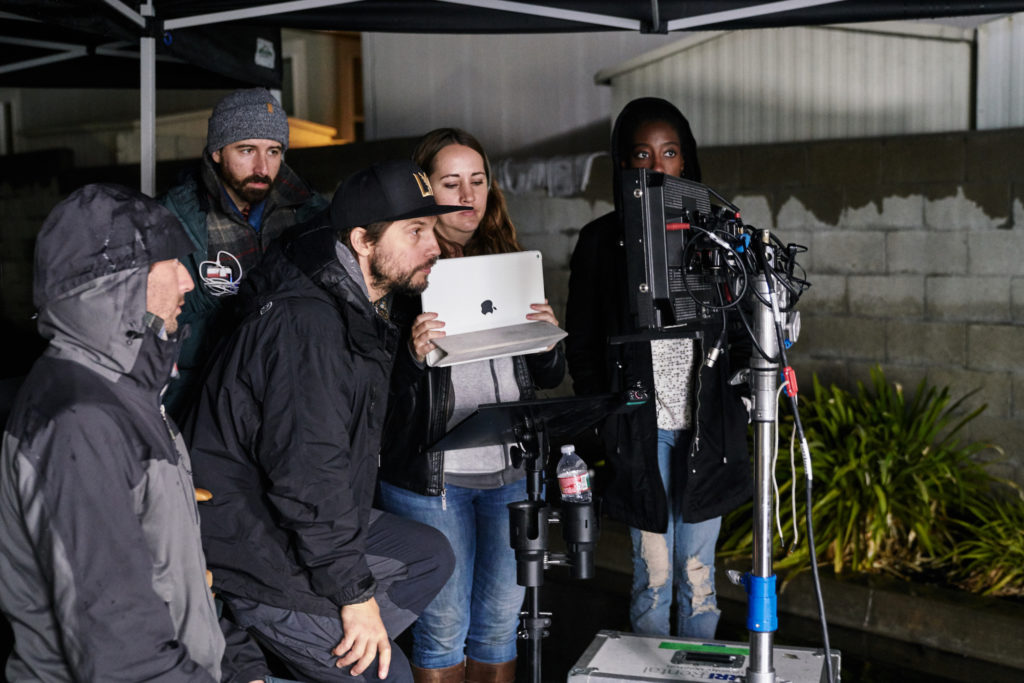
__
Thanks to Logan for talking to us about ADOPT A HIGHWAY.
This interview has been edited for clarity.
If you’re an independent filmmaker or know of an independent film-related topic we should write about, email blogadmin@sagindie.org for consideration.

